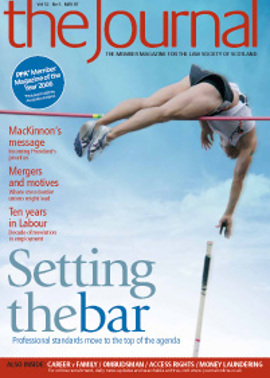Under commission

William Penn advised that you should “avoid popularity; it has many snares, and no real benefit”. Avoiding popularity is the least of my worries. When I was asked to lead the implementation of the Scottish Legal Complaints Commission, I was aware of the strong words and stronger opinions exchanged during the progress of the bill. The opinions still exist but I am grateful to the Law Society of Scotland and the Faculty of Advocates that the strong words have been replaced by a constructive dialogue.
I recognise that many in the legal community regard the new Commission as a threatening and unwelcome imposition. It is not my job to justify the Act. The bill was passed and the Commission will be operational by October 2008, if not before. My role is to help the new commissioners establish an organisation that efficiently and effectively executes its statutory responsibilities.
The core function of the new Commission is to investigate and resolve service complaints. My intention is that the Commission adopts and maintains the highest investigative standards. We will be neutral, thorough and professional. We will follow best practice and learn from the experience of proven investigative organisations like the Scottish Public Services Ombudsman. We will take an inquisitorial approach, make no assumptions and will only allow facts to drive the conclusions. .
Acting with discretion.
I recognise the concerns expressed about how the Commission will use its discretionary powers. I cannot pre-empt the Commission but, in my opinion, it will not achieve credibility, nor serve the interests of the public, if it acts unwisely and without due care. .
It will need to apply its discretion in a logical, transparent and sustainable manner. Only a foolish football referee hands out a red card for the first foul – otherwise there may be no players left on the pitch by half time. .
In operational terms, my intention is that the Commission proves itself to be a disciplined, process-driven organisation and that it gains respect, if not popularity, for the quality of its investigations. I also commit to keeping the costs of the new Commission as low as possible without compromising capacity or capability. We will certainly be looking to maximise shared services and other organisational efficiencies.
In terms of policy, I think that the Commission may well take a more expansive view of service, as opposed to conduct. I think the Commission will, hopefully without compromising its neutrality, see service primarily through the eyes of the consumer. Technical excellence will remain hugely important, but it will not be the only factor. The important questions are, what are the appropriate standards of service and who should define them?
Badge of quality
I believe that it would not be in the interests of the public, or the legal profession, for the Commission simply to impose service standards on solicitors and advocates. A standard imposed is not a standard owned. Ideally, the minimum acceptable standards for service, as expected by the Commission, should be lower than those voluntarily adopted by the profession. That way a practitioner deemed to have fallen below the standards expected by the Commission would also have fallen further below the standards of their own profession. However, if the legal profession cannot agree and commit itself to suitable standards, then the Commission will have no choice but to define them. The new commissioners will be in place from October. The profession has a window of opportunity. One of the quoted problems with setting standards across the profession is the range of different propositions offered by solicitors. How can we have the same standards if we are so different? One answer is that the Society could adopt a base set of service standards that apply to all its members – irrespective of the client or the circumstances. This ties in with Ruthven Gemmell’s promotion of universal standards to protect the excellence and respect of the solicitor’s “badge”. In addition to these base standards there could be another universal commitment to properly define, communicate and maintain the service standards of the practice. In other words, all solicitors commit first to the Law Society of Scotland base standards and then secondly to the higher and/or additional standards of their practice. This would give the public strong and consistent assurance, but would also allow for clear differentiation of service by practices.
The Commission will see nothing wrong with such differentiation of service, providing the minimum standards are met and preferably exceeded. The key is ensuring that the client is always made aware of and understands the service they are funding. I find it difficult to imagine the Commission upholding a complaint if the practitioner has simply done what they clearly said they would do. If you want a Lada, buy a Lada. If you want a Lamborghini, buy a Lamborghini. If you want a Lamborghini, don’t buy a Lada and then complain that it doesn’t do 0-60 in 4 seconds.
I urge the Society to take up quickly and seriously the challenge of defining its own service standards. Not guidance but clear, measurable and appropriate standards.
Model approach
It is my intention to present the commissioners with a draft operating model for the new organisation in October. This model will contain the suggested process, definitions and working practices. It will also include suggested guidelines for the use of the Commission’s discretionary powers. I have invited the Society, the Faculty of Advocates and other members of the implementation steering group to work with me on the draft operating model and I am grateful for their support.
Edgar Allan Poe said that there are very few occasions when “mere popularity should be considered a proper test of merit”. Even if this Commission never achieves popularity, I hope that it can become a force for good. To identify and address poor practice. To inform, help and reassure the public. To recognise and promote good practice. To work with and encourage the legal profession. And, by doing all these things well, to contribute to a reduction in complaints.
Richard Smith is Interim Chief Executive of the Scottish Legal Complaints Commission
In this issue
- Block fees: the story behind the changes
- Strategic advance
- Court plans with little appeal
- Under commission
- Two into one can go
- Ten years of labour
- Career v Family
- Monitor - at your own risk
- Raising the standard
- Society shapes the changes
- Society shapes the changes (1)
- Money laundering to change again
- Border and Immigration Agency launches
- Dealing positively with client concerns
- From the Brussels office
- Winning ways
- Toothless against spam?
- Risk reinvented
- Technical but essential
- Pension sharing tips on divorce
- In pursuit of simplicity
- In pursuit of simplicity (1)
- First in the class
- Scottish Solicitors' Discipline Tribunal
- Website reviews
- Book reviews
- On the road
- Access or excess?
- Alterations are no 2 problem
- ARTL: upgrade now for security






